Related Research Articles

The 1872 United States presidential election was the 22nd quadrennial presidential election, held on Tuesday, November 5, 1872. Despite a split in the Republican Party, incumbent President Ulysses S. Grant defeated Democratic-endorsed Liberal Republican nominee Horace Greeley.

The 1872 Canadian federal election was held from July 20 to October 12, 1872, to elect members of the House of Commons of Canada of the 2nd Parliament of Canada. Prime Minister Sir John A. Macdonald's Conservative Party remained in power, defeating the Liberals. However, the Liberals increased their parliamentary representation considerably, while the Conservative seat count remained static, giving them only six more seats than the Liberals. The election produced the country's first minority government. The support of two independent Conservative MPs functionally gave Macdonald an extremely slim majority that allowed it to survive for two years, until it fell due to scandal.
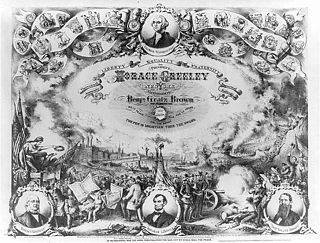
The Liberal Republican Party was an American political party that was organized in May 1872 to oppose the reelection of President Ulysses S. Grant and his Radical Republican supporters in the presidential election of 1872. The party emerged in Missouri under the leadership of Senator Carl Schurz and soon attracted other opponents of Grant; Liberal Republicans decried the scandals of the Grant administration and sought civil service reform. The party opposed Grant's Reconstruction policies, particularly the Enforcement Acts that destroyed the Ku Klux Klan. It lost in a landslide, and disappeared from the national stage after the 1872 election.

The 1872–73 United States House of Representatives elections were held on various dates in various states between June 4, 1872, and April 7, 1873. Each state set its own date for its elections to the House of Representatives before the first session of the 43rd United States Congress convened on December 1, 1873. They coincided with the re-election of United States President Ulysses S. Grant. The congressional reapportionment based on the 1870 United States census increased the number of House seats to 292.
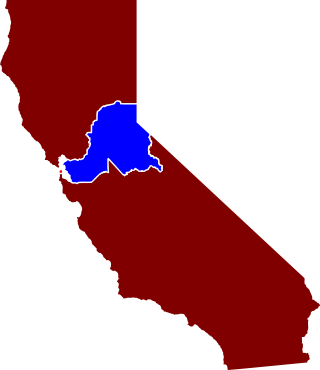
The United States House of Representatives elections in California, 1872 was an election for California's delegation to the United States House of Representatives, which occurred as part of the general election of the House of Representatives on November 5, 1872. California gained one seat as a result of the 1870 census, which the Republicans won. The Democrats, however, gained a Republican-held district.
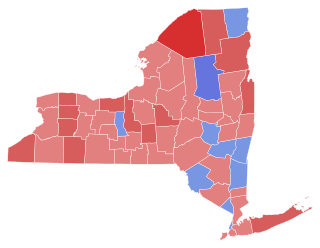
The 1872 New York state election was held on November 5, 1872, to elect the governor, the lieutenant governor, a Canal Commissioner, an Inspector of State Prisons and a U.S. Representative-at-large, as well as all members of the New York State Assembly.

The 1872 Democratic National Convention was a presidential nominating convention held at Ford's Grand Opera House on East Fayette Street, between North Howard and North Eutaw Streets, in Baltimore, Maryland on July 9 and 10, 1872. It resulted in the nomination of newspaper publisher Horace Greeley of New York and Governor Benjamin Gratz Brown of Missouri for president and vice president, a ticket previously nominated by the rump Liberal Republican faction convention meeting, also held in Baltimore's newly built premier Opera House of nationally well-known theatre owner/operator John T. Ford of the major Republican Party, which had already re-nominated incumbent President Ulysses S. Grant of the regular Republicans for another term.

The 1872–73 United States Senate elections were held on various dates in various states, coinciding with President Ulysses S. Grant's re-election. As these U.S. Senate elections were prior to the ratification of the Seventeenth Amendment in 1913, senators were chosen by state legislatures. Senators were elected over a wide range of time throughout 1872 and 1873, and a seat may have been filled months late or remained vacant due to legislative deadlock. In these elections, terms were up for the senators in Class 3.
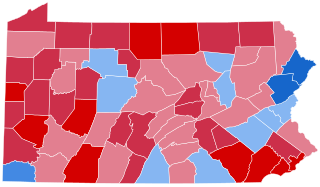
The 1872 United States presidential election in Pennsylvania took place on November 5, 1872, as part of the 1872 United States presidential election. Voters chose 29 representatives, or electors to the Electoral College, who voted for president and vice president.

The 1872 United States presidential election in New York took place on November 5, 1872. All contemporary 37 states were part of the 1872 United States presidential election. Voters chose 35 electors to the Electoral College, which selected the president and vice president.
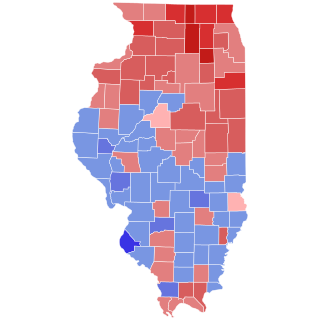
The 1872 Illinois gubernatorial election was the fifteenth election for this office. Republican nominee, Former Governor Richard J. Oglesby defeated the Democratic and Liberal Republican nominee Gustavus Koerner. B. G. Wright represented Independent Democrats unwilling to ally with Liberal Republicans. Oglesby had agreed to run for the Governorship but to resign upon being elected so that Lt. Governor John Lourie Beveridge could assume the office. Oglesby was in turn appointed to the U.S. Senate.

The 1872 United States elections were held on November 5, electing the members of the 43rd United States Congress. The election took place during the Third Party System. The election took place during the Reconstruction Era, and many Southerners were barred from voting. Despite a split in the party, the Republicans retained control of the presidency and both houses of Congress.

The 1872 United States presidential election in Virginia took place on November 5, 1872, as part of the 1872 United States presidential election. Voters chose 11 representatives, or electors to the Electoral College, who voted for president and vice president.

In 1872, Horace Greeley ran unsuccessfully for President of the United States. He served as the candidate of both the Democrats and the Liberal Republicans, in the 1872 election. In the run-up to the 1872 United States presidential election, major changes occurred in the United States. Specifically, the 15th Amendment gave African Americans the right to vote for the first time, while the government cracked down on the Ku Klux Klan. In addition, the economy was still in good shape and President Ulysses S. Grant's corruption scandals for the most part was still not public knowledge. With this background, the incumbent U.S. President was able to decisively defeat Greeley.

The 1872 United States presidential election in Ohio was held on November 5, 1872, as part of the 1872 United States presidential election. State voters chose 22 electors to the Electoral College, who voted for president and vice president.
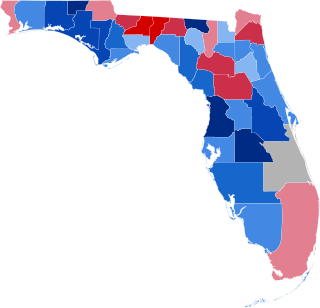
The 1872 United States presidential election in Florida took place on November 5, 1872, as part of the 1872 United States presidential election. Voters chose four representatives, or electors to the Electoral College, who voted for president and vice president.

The 1872 United States presidential election in Minnesota took place on November 5, 1872, as part of the 1872 United States presidential election. Voters chose five representatives, or electors to the Electoral College, who voted for president and vice president.

The 1872 United States presidential election in Iowa took place on November 5, 1872. All contemporary 37 states were part of the 1872 United States presidential election. The state voters chose 11 electors to the Electoral College, which selected the president and vice president.
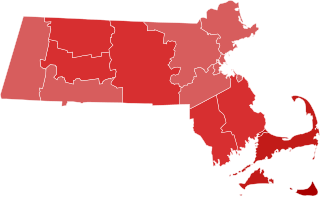
The 1872 Massachusetts gubernatorial election was held on November 5, 1872. Republican governor William B. Washburn was re-elected to a second term in office over businessman Francis W. Bird, a Liberal Republican nominated with support of the Democratic Party.

The 1872 Florida gubernatorial election was held on November 5, 1872. Republican nominee Ossian B. Hart defeated the Liberal Republican Party nominee William D. Bloxham.